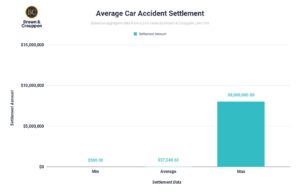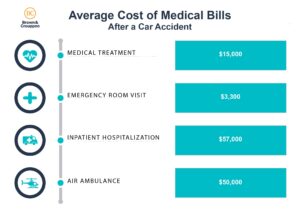Lost Wages – Explained
In the context of a personal injury claim, “lost wages” refers to income, benefits, and other compensation you would have received had you not been injured in a car accident. If someone else’s negligence caused the collision, their insurer (or themselves) may be responsible for reimbursing you for these financial losses.
Lost wages can encompass:
- Regular Earnings: Your hourly rate or salary for the days, weeks, or months you cannot work.
- Overtime and Seasonal Pay: If you typically earn extra income from overtime or special projects, you may recoup those lost opportunities.
- Bonuses and Commissions: Performance-based earnings can qualify as lost wages if you were on track to receive them before your accident.
- Paid Time Off (PTO): Although you may have “used” sick leave or vacation days, these benefits have real value. You can seek reimbursement if your accident forced you to spend this accrued time.
- Employer-Provided Benefits: Some roles include profit-sharing, retirement contributions, or allowances for transportation and cell phones. Missing out on these benefits could merit compensation.
- Potential Raises or Promotions: If you missed an annual review or performance window for a raise, your attorney can fight for those lost earnings.
- Future Earning Capacity: Severe or long-term injuries might limit your ability to perform the same job. You may recover damages if your earning potential suffers permanently.
Because settlement agreements usually bar future claims, it’s vital to identify every income source you’ve lost. Once you accept a payout, you can’t typically return for more compensation later if you realize you left out important details.
Factors Affecting How Long It Takes to Recover Lost Wages
The time it takes to recover lost wages in a car accident settlement depends on factors like injury severity, medical treatment duration, and the quality of documentation provided. Insurers may delay payments by requesting excessive paperwork or disputing claims, but strong evidence—such as pay stubs and employer verification—can speed up the car accident settlement process. Legal representation can also help counter bad-faith tactics and push for a timely settlement.
1. Fault and Liability
One of the biggest time-determining factors is whether fault is clear. If the other driver’s negligence is obvious – say, they were texting and hit you from behind – you may secure a settlement sooner. However, if there’s any dispute over who caused the crash, negotiations often slow. Both sides might gather additional evidence (e.g., accident reports, witness statements) to prove liability, which can add weeks or months to the process.
2. Severity of Injuries
More serious injuries generally mean higher lost wage claims, and insurance companies tend to contest larger payouts more aggressively. Your lawyer may also wait until you reach maximum medical improvement (MMI) to ensure all medical costs and lost earning opportunities are accurately calculated. This step, while necessary, can extend the timeline.
3. Negotiations vs. Litigation
Many lost wage claims settle without going to court. If the at-fault party’s insurer offers a fair settlement early, you may resolve your claim in under a year. But if they stall, deny liability, or undervalue your damages, filing a lawsuit could be your best option. Litigation may add considerable time, though sometimes the threat of a trial convinces insurers to negotiate more fairly.
4. State-Specific Laws and Insurance Coverage
Each state has its own insurance regulations. In a fault-based state like Missouri, injured parties typically pursue the at-fault driver’s bodily injury liability coverage. If that driver is uninsured or underinsured, you may turn to your own uninsured motorist (UM) coverage. Sorting through these details can speed up or delay payment, depending on how complex the coverage issues are.
5. Efficiency of Documentation
Collecting thorough evidence of your employment, wages, and medical limitations is key. The time it takes to gather pay stubs, employer letters, physician notes, and other documentation can directly affect how soon you see any compensation. Missing or incomplete records often cause adjusters to pause or deny claims, requiring additional back-and-forth.
6. Preparing for Potential Court Dates and Delays
Should your case enter litigation, local court schedules and procedural requirements can stretch out the timeline further. Motions, depositions, and discovery all add steps. While many lawsuits settle before trial, preparing for trial may still extend your overall wait.
How a Lawyer Can Help You Recover Lost Wages
While you’re already dealing with medical appointments, physical limitations, and daily responsibilities, filing and negotiating a lost wage claim can be overwhelming. A qualified attorney can:
- Identify All Sources of Income: Beyond basic wages, you might overlook overtime, commissions, bonuses, or even an upcoming promotion. A lawyer ensures every missed earning opportunity is included in your claim.
- Gather Robust Documentation: Insurers may question whether your injuries truly prevent you from working. Attorneys collect doctor’s notes, treatment records, and employer statements that demonstrate why you had to miss work.
- Counter Bad-Faith Tactics: Some insurers delay claims or request repetitive documentation to wear you down. A lawyer recognizes these tactics and keeps the process on track.
- Negotiate for a Fair Settlement: Insurance adjusters routinely start with lower offers, hoping to minimize payouts. Your attorney will handle the negotiation process, pushing for an amount that accurately reflects your lost wages.
- Pursue Litigation if Necessary: If negotiations stall, your lawyer can file a lawsuit and represent you in court. Even the possibility of litigation often compels insurers to offer a more reasonable settlement.
This guidance frees you to focus on healing rather than chasing down paperwork or battling inexperience with insurance companies.
How to Document Lost Wages to Help Your Claim
Comprehensive, well-organized documentation can help prove fault after a car accident, and it can also mean the difference between a swift settlement and a prolonged dispute. Insurers process countless claims, and they look for reasons to reduce payments. Strengthen your lost wages claim with:
- Pay Stubs and Tax Records: Collect several months’ worth of pay statements from before your accident. If you’re self-employed, provide tax returns, invoices, and bank statements demonstrating your typical earnings.
- Employer Verification: A letter from your employer confirming your position, pay rate, missed days, and lost opportunities (like bonuses) can be highly persuasive.
- Medical Records: Physician notes specifying why you can’t perform your normal duties can refute an insurer’s argument that you could have returned to work sooner.
- Proof of Used PTO: Track the sick days or vacation time you used to attend appointments or to recover from injuries. Using these benefits for accident-related issues represents a tangible loss.
- Evidence of Future Losses: When you won’t be able to work at the same level long term – due to permanent disabilities or job restrictions – you might need statements from vocational experts or medical specialists.
- Communication Records: Keep emails, letters, or any written communication discussing missed opportunities for raises, commissions, or promotions.
Having these details ready from the outset often expedites the entire process, as insurers have fewer grounds for challenging your lost wage calculation. Here’s a step-by-step guide on how to claim lost wages.
Compensation You May Be Eligible to Recover on Top of Lost Wages
While lost wages are a major concern, you can typically pursue a range of damages after a car accident, including:
- Medical Expenses: Hospital bills, doctor visits, prescription costs, physical therapy, and future care needs may all be compensable, provided you can connect them to the accident.
- Pain and Suffering: Beyond financial losses, you may receive compensation for the emotional distress, chronic pain, or reduced quality of life caused by your injuries.
- Property Damage: Repairing or replacing your vehicle (and any other personal property damaged in the crash) can be added to your total damages. Temporary transportation costs, like a rental car, also qualify.
- Wrongful Death Damages: If a loved one passes away due to the accident, surviving family members may file a wrongful death claim seeking funeral expenses, loss of support, and related losses.
- Punitive Damages: In certain states and circumstances – such as extremely reckless behavior by the at-fault driver – a court may award punitive damages aimed at punishing wrongdoing.
Seeking fair compensation in all applicable areas ensures you’re not left footing the bill for accident-related losses that weren’t your fault.
Get Help Recovering Lost Wages with a Free Case Evaluation
Facing the possibility of missing months of work (or more) can feel daunting. You may wonder how you’ll cover your rent, mortgage, or other bills without a regular paycheck, especially as medical expenses mount. The good news is that if another driver’s negligence caused your crash, you have legal rights to pursue lost wages and other damages.
Hiring a car accident lawyer means you have someone in your corner who understands the finer points of fault disputes, insurance policies, and long-term injury impacts. Instead of juggling medical appointments, family obligations, and high-stakes negotiations, you can focus on your health while your attorney handles the rest.
Our team recognizes how unsettling it can be to suddenly lose your main source of income. We’re committed to helping you recover every dollar you’re owed – whether by skillfully negotiating with the insurance company or, if necessary, taking your case to court.
Starting your case is easy. Contact us at (888) 803-2581 for a free consultation or fill out our free case review form online. Remember, if you don’t get paid, we don’t get paid. Our goal is to make the legal process as straightforward and stress-free as possible so that you can focus on your recovery.







